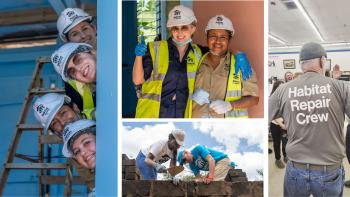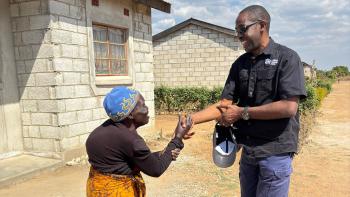Habitat youth volunteers leverage technology to tackle housing access challenges

CEBU CITY, PHILIPPINES (2025) Habitat for Humanity Youth Assembly. James Shrestha presents his team’s Smart Housing Nepal poster.

CEBU CITY, PHILIPPINES (2025) Habitat for Humanity Youth Assembly. Fahim Hossain, Md., presents his team’s H-Map poster.
Innovative young leaders are reshaping the future of housing. Through funding from the Habitat Youth Solutions grant in the Asia Pacific region, passionate youth are leveraging creativity, technology and volunteerism to advance housing solutions.
From coastal Bangladesh to urban Nepal, two youth-led initiatives are using data and digital tools to create safer, more resilient communities — each shaped by the realities of local life.
Digital solutions for disaster-prone communities in Bangladesh
Fahim Hossain, Md., a younger engineer turned entrepreneur, started his own company, Green Lead. His team is helping to build the resilience of communities without access to adequate housing and are facing an increase in extreme weather events. Their project helps coastal Bangladesh communities prepare and recover from disasters like cyclones and floods.
Accessible online and offline, their platform maps homes and neighborhoods at risk, flagging vulnerable areas and gaps in access to water and sanitation. Following a severe weather event, families can request repairs from local service providers directly through the app, ensuring faster and more coordinated recovery.
The grant will help Fahim’s team reach more than 5,000 low-income residents and strengthen partnerships with local governments, nonprofits and nearby communities.
“This grant is a life-changing experience for young people like me. We can collaborate together, sharing ideas across countries and across borders.”— Fahim Hossain, Md., Habitat Youth Volunteer
Data tools for safer urban housing in Nepal
James Shrestha, a young data innovator, and his team at Open Knowledge Nepal are addressing the health and environmental risks that urban residents face. Their app helps identify hidden dangers in the Kathmandu Valley, including flood zones, earthquake risks, unsafe structures and poor air quality.
Their platform creates risk profiles for homes, businesses, and public spaces, helping people make informed decisions when renting or buying. The project will benefit those most likely to live in unsafe housing, such as migrant workers and low-income families, while also giving local leaders data to improve housing across more than 10,000 properties.
“Home is more than just a building — it’s a place where you belong. That’s why this grant matters. Young people and volunteers can bring their diverse perspectives and innovative ideas to build up products and showcase them to the world.”— James Shrestha, Habitat Youth Volunteer
Young leaders creating lasting change
These two projects highlight the diversity of our community and the countless young volunteers working alongside them. Together, with their communities, these young leaders are tackling the housing crisis with innovative, people-centered solutions.


